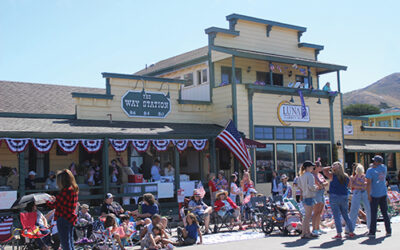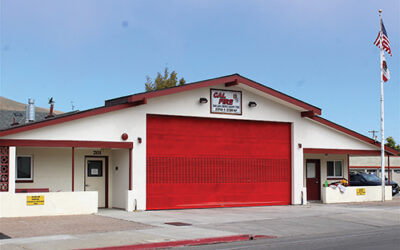A proposal to turn a North Morro Bay motel into a “supportive housing” facility has been appealed to the Planning Commission, with a hearing date expected to be scheduled for April.
Community Development Director, Scot Graham said a minor use permit for the project, located at 2460 N. Main St., to turn the Rodeway Inn (formerly the Twins Bay Inn and Best Western El Rancho) into a sober living and treatment facility, geared to help first responders, was approved over the counter Feb. 22.
“The supportive housing project was approved at staff level [as required by state law and city ordinance],” Graham told Estero Bay News in a March 3 email.
They received an appeal of the approval on March 2. “I haven’t had a chance to review the appeal,” Graham said, “but I think we are shooting for one of the April hearing dates (6th or 20th) for Planning Commission review.” (See the project documents at: www.morro-bay.ca.us/842/Current-Planning-Projects.)
The applicant is listed as Brian Der Vartanian, one of the principles of Morro Bay Recovery, Inc., a group that owns the motel. It has 27 rooms and according to a news story, the owners want to establish an “alcohol and drug rehab center” for special patients.
“Our objective is to provide help for first responders such as firefighters and police,” Der Vartanian told the Tribune in a Feb. 23 story, “as well as to anyone with unfortunate circumstances who has become addicted to alcohol and drugs.”
Senate Bill 2 (SB2), according to Graham, specifically allows changing uses on such properties. “These types of project are required to be approved administratively per California Government Code.”
With the exception of having to adhere to all the zoning standards of the property, there apparently isn’t much the City can do to stop it, even if it wanted to.
City Zoning code No. 17.12.626 on supportive housing reads, “’Supportive housing’ means housing with no limit on length of stay, that is occupied by a target population, and that is linked to an onsite or offsite service that assists the supportive housing resident in retaining the housing, improving his or her health status, and maximizing his or her ability to live, and, when possible, work in the community.”
Graham added that in the State Health and Safety Code (No. 53260) target populations are listed as “low-income person with mental disabilities, AIDS, substance abuse or chronic health conditions, or persons whose disabilities originated before the age of 18.”
The law also allows for supportive uses focusing on retaining housing, living and working in the community, and/or health improvement, which a sober living facility might provide.
“Transitional housing is defined in Health and Safety Code Section 50675.2 as buildings configured as rental housing developments, but operated under program requirements that call for the termination of assistance and recirculation of the assisted unit to another eligible program recipient at some predetermined future point in time, which shall be no less than six months. It may be designated for a homeless individual or family transitioning to permanent housing.”
Graham said SB2 “requires” that these projects be “processed as residential uses and subject only to those development standards and restrictions that apply to other residential uses of the same type in the same zone.”
Though the project has yet to be placed on a public agenda, word of it spread on the Morro Bay Next Door social media site and just about every comment of dozens posted was in opposition, claiming everything from a potential loss of property values, to creating a dangerous situation for children that walk past on their way to Del Mar Elementary over a mile away. And, somewhat oddly, numerous negative commenters acknowledged the need for a rehab facility.
There have been other sober living facilities in town, most notably one in a single family home in the Heights.
But a sober living home proposed several years ago on LaJolla Street that would have had up to 14 people living there, was met with fierce opposition by neighbors and dropped.
But with the law change, there may not be anything beyond setting certain special conditions on the project that the City can do about it. Even its own ordinances allow it.
“In 2014 the Morro Bay City Council adopted Ordinance No. 584,” Graham said, “which amends the Zoning Ordinance to add the current definition of transitional housing and supportive housing, and lists these as permitted uses in all zoning districts allowing residential uses.”
The initial plans say there could be from 27-40 people living there mostly in individual rooms, though some clients might share a room. Plus there’s a counseling center and a kitchen/dining area. The owners also want to put up a privacy fence around the sizable property.
Projects approved over the counter by the planning director are appealable to the Planning Commission. The PC’s decision is appealable to the City Council, but the appeals stop there.
The project is outside the Coastal Commission’s appeal jurisdiction, so if residents wanted to continue to fight against it, should the City Council approve it, they would have to sue.
Celebrating two 50th Anniversaries
Cayucos’ Way Statiopn was front and center at the Cayucos Independence Day Parade. Cayucos will celebrate a pair of...


